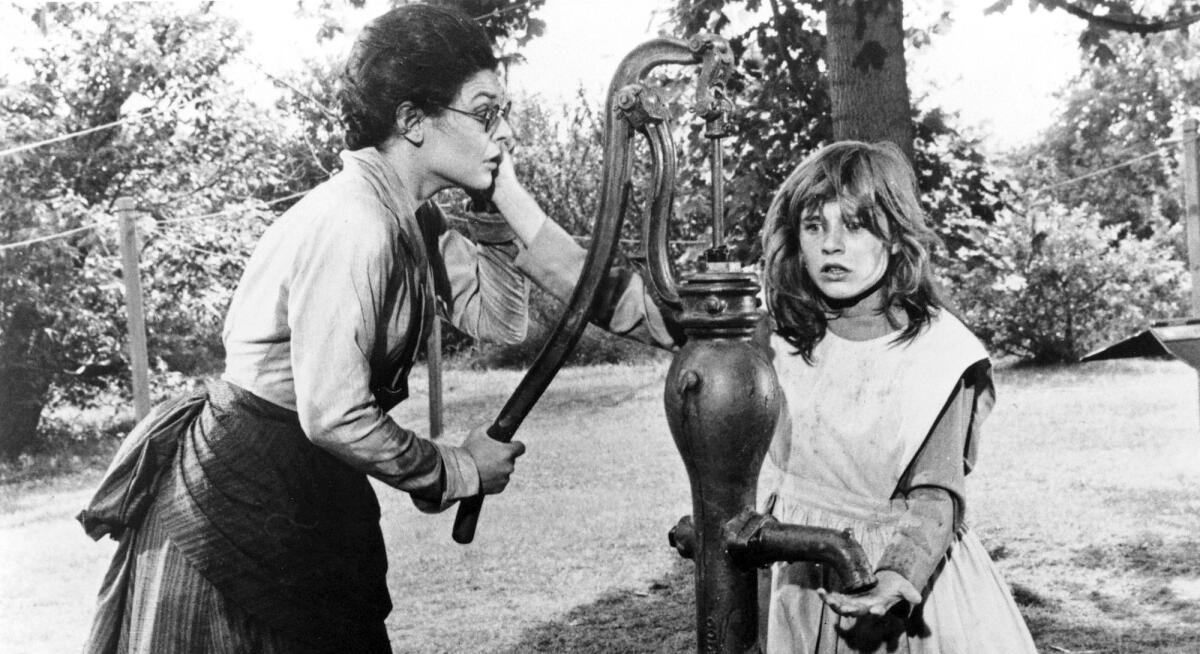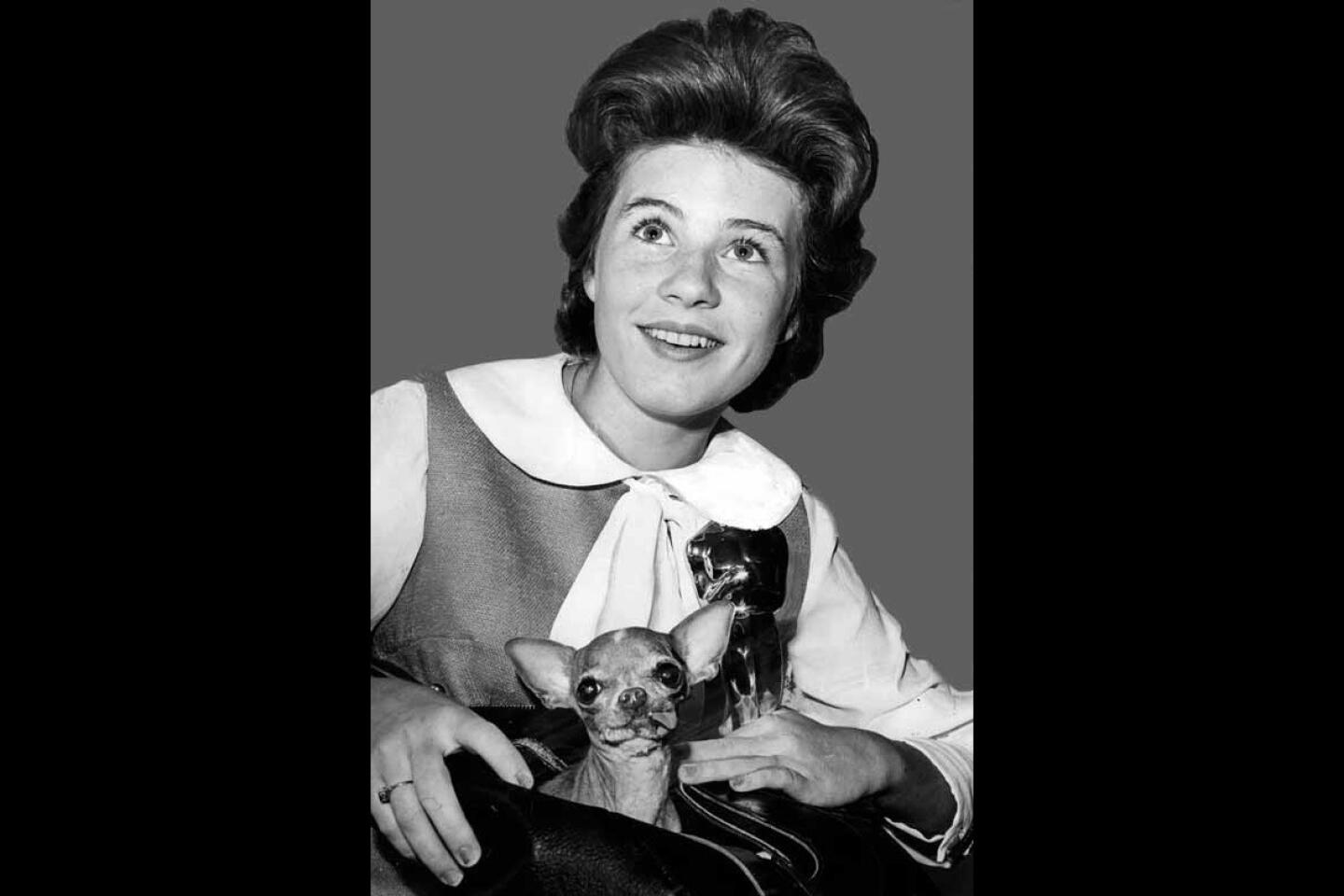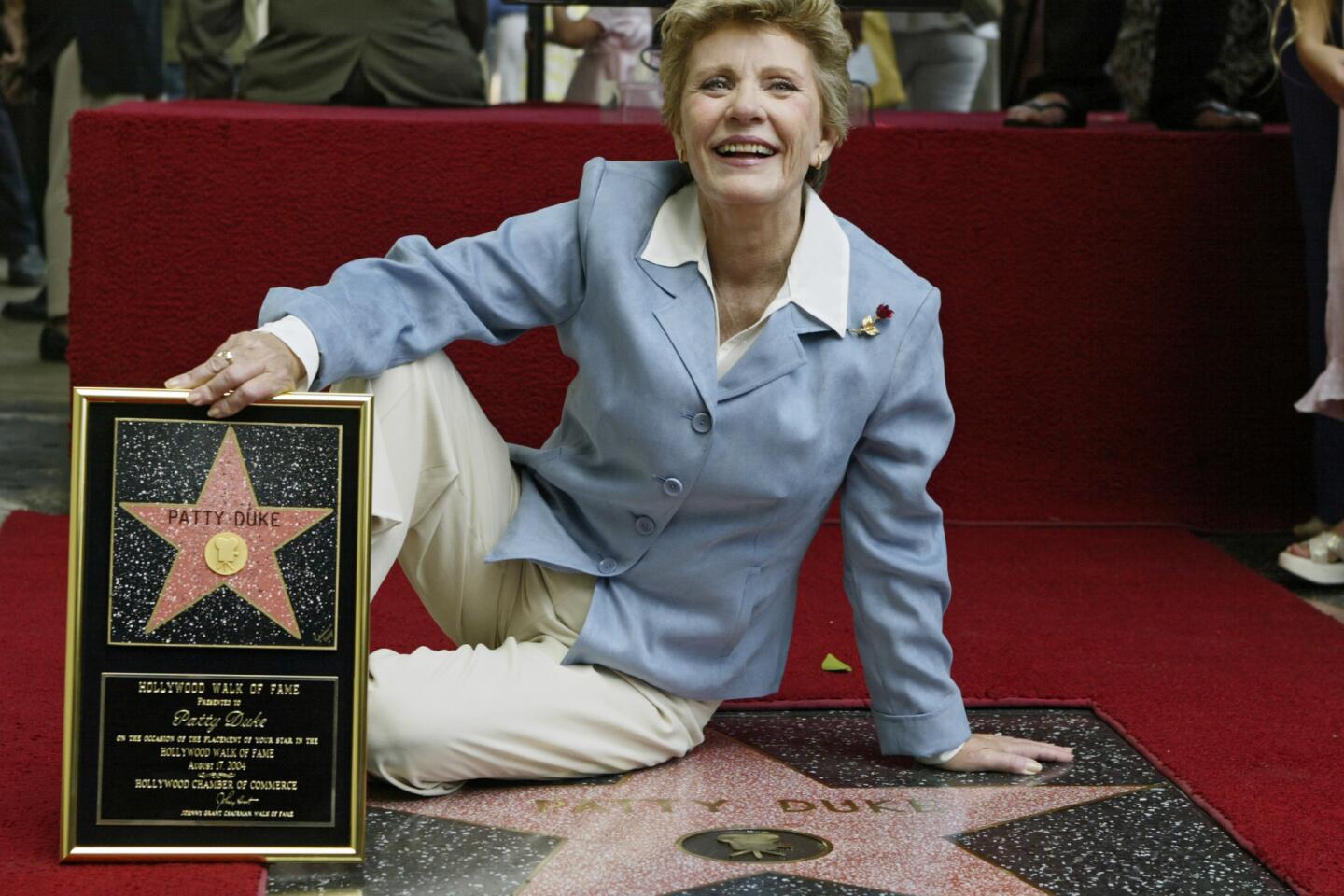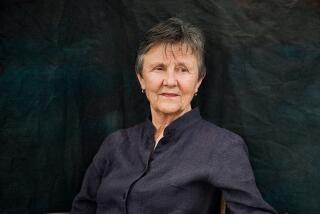Patty Duke dies at age 69; Oscar-winning actress and mental health advocate

Patty Duke came to fame as a teenager, combining both a masterful talent for dramatic acting with a sunny, all-American image that enchanted both TV and film audiences. But her admirers had no clue about the much-uglier reality of Duke’s childhood, marred by nightmarish abuse and exploitation. Overcoming her troubles in her adult years, Duke became an outspoken advocate for mental health causes.
Duke, who won an Oscar at age 16 for her portrayal of Helen Keller in “The Miracle Worker” but was more known for her bouncy 1960s TV sitcom “The Patty Duke Show,” died Tuesday at age 69 at a hospital in Coeur D’Alene, Idaho.
The cause of death was sepsis from a ruptured intestine, Duke’s manager, Holly Shelton, confirmed to The Times.
“This morning, our beloved wife, mother, grandmother, matriarch and the exquisite artist, humanitarian, and champion for mental health, Anna ‘Patty Duke’ Pearce, closed her eyes, quieted her pain and ascended to a beautiful place,” Duke’s son, actor Sean Astin, said in a statement posted to his Facebook account. “We celebrate the infinite love and compassion she shared through her work and throughout her life.”
The actress was born Anna Marie Duke on Dec. 14, 1946, in Elmhurst, N.Y., the youngest of three children in a blue-collar family plagued by alcoholism and mental illness. Her parents, John and Frances Duke, separated when she was 6, and from the time she was 8, Duke was raised by talent managers John and Ethel Ross.
The couple controlled nearly every aspect of her life and career, changing her name to Patty in imitation of child star Patty McCormack, limiting Duke’s contact with her mother, supplying her with alcohol and prescription medication when she was 13 and even encouraging her to lie before a grand jury investigating the quiz show scandal in 1959 (she had appeared on “The $64,000 Challenge”).
“They were very misguided people,” Duke told The Times in 2013.
In 1959, Duke debuted as Helen Keller in the Broadway production of “The Miracle Worker” with Anne Bancroft. The play later was adapted into a film that earned Duke the Academy Award for supporting actress for her portrayal of Keller, who became deaf and blind after a childhood illness. At the time, Duke was 16, becoming the youngest person to receive an Oscar in a competitive category.
“It seems like a dream,” she told The Times in 1963 after her Oscar win. “I’m still not sure if it happened. When they announced it, I just sat there. I couldn’t move.”
Duke parlayed her Oscar glory into a star TV vehicle, “The Patty Duke Show,” which was created by novelist Sidney Sheldon and aired on ABC from 1963 to 1966. She played both main characters: Patricia “Patty” Lane, a boy-crazy, bubble gum-chewing all-American teenager, and Catherine “Cathy” Lane, her sophisticated identical cousin from Scotland. With guest appearances by pop stars including Chad and Jeremy and Frankie Avalon, the show, with its irresistible theme song (“But Patty loves to rock ‘n’ roll, a hot dog makes her lose control. What a wild duet!”) was a hit.
But the star was never able to enjoy her popularity. The Rosses wouldn’t let their star client watch the show, lest she get a swollen head.
“Patty was very embarrassing to me,” she told The Times in 2013. “They would write those outrageous things for her to do. I would dive in and do it, but I couldn’t wait to get to Cathy. She was sensible, and I’d like to think she was classy.”
After “The Patty Duke Show” came to an end, Duke, like so many other child stars, was eager to break free from her wholesome image, accepting a role as hard-drinking, pill-popping singer Neely O’Hara in “Valley of the Dolls,” the 1967 film adaptation of Jacqueline Susann’s tawdry bestseller. Audiences weren’t ready to accept Duke in such an adult light, and the film was panned by critics.
It wasn’t until 1982 that a psychiatrist diagnosed Duke with bipolar disorder, then known as manic depression. With a combination of medication and therapy, the actress was eventually able to reach equilibrium. In 1988, she revealed her long battle with mental illness and the harrowing abuse she’d suffered as a child in her autobiography, “Call Me Anna,” written with Times film critic Kenneth Turan. The book, which became a bestseller and was made into a 1990 TV movie for ABC (in which Duke also starred), is widely credited with helping to remove the stigma attached to mental illness.
“I was very frightened when I wrote the book,” she told The Times in 1990. “You fear if you reveal yourself as having a mental illness, you are unemployable, you are an oddball.”
The actress became a visible champion for mental health causes, lobbying Congress for research and awareness funds.
Duke’s struggles with mental illness did little to dampen her popularity within the industry. She served as president of the Screen Actors Guild from 1985 to 1988, the second female president of the union.
She remained active professionally in her later years with recent guest roles on “Glee,” “Hawaii Five-O” and “Liv and Maddie.”
She even found it in her heart to forgive the Rosses. “It’s obvious to me that had they not crossed my path, the likelihood of my becoming an actress was slim,” she wrote in “Call Me Anna,” “and the joy of that far outweighs any of the pain.”
Times staff writer Yvonne Villarreal contributed to this report.
MORE:
Patty Duke remembered by celebrities as a screen legend: ‘Thank you for sharing your talent’
How Patty Duke broke a Hollywood taboo and became a mental health pioneer
Patty Duke was a child star on screen, but a late bloomer on stage
More to Read
Start your day right
Sign up for Essential California for the L.A. Times biggest news, features and recommendations in your inbox six days a week.
You may occasionally receive promotional content from the Los Angeles Times.











